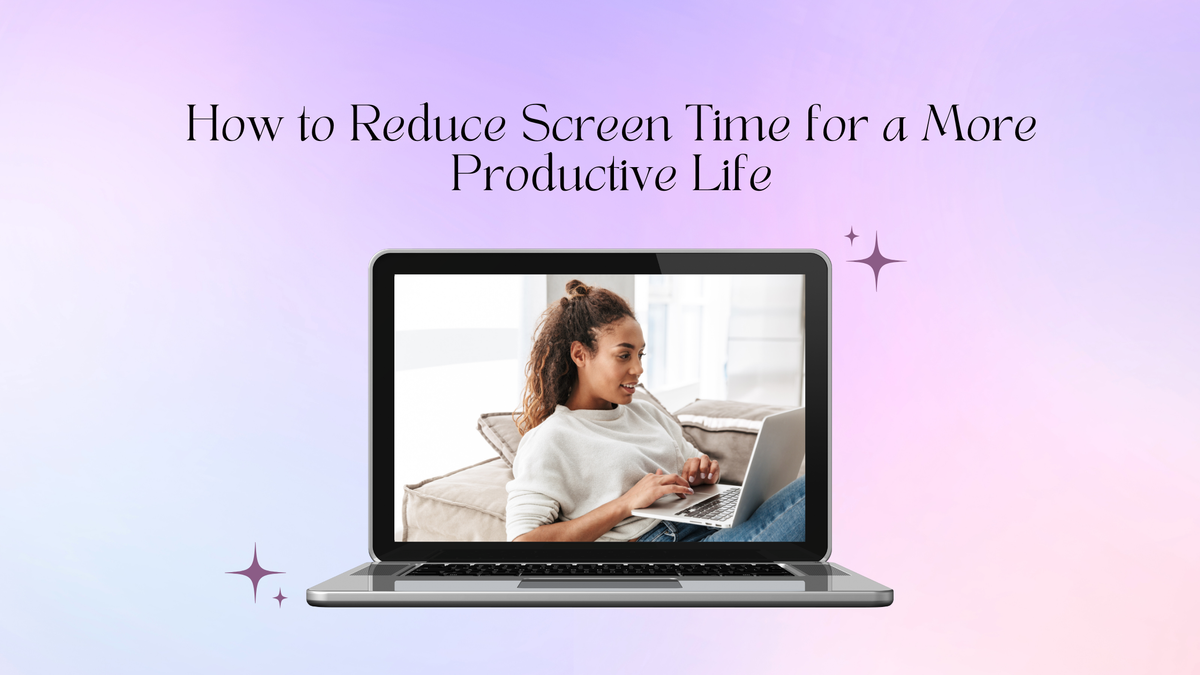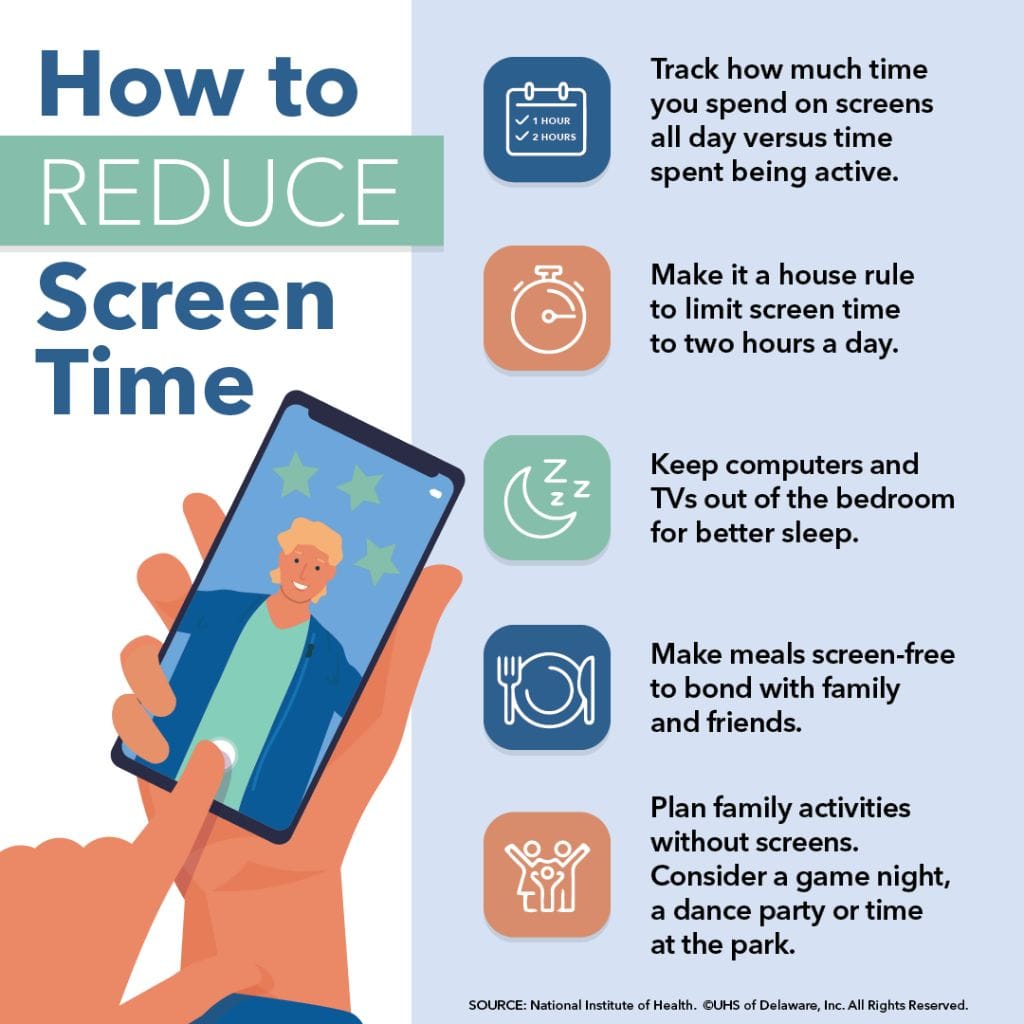How to Reduce Screen Time for a More Productive Life ?

In today's digital world, it almost feels like we're experiencing the whole world through a digital screen. The average person spends upwards of 45% of their waking hours on internet-connected devices — and that doesn't event account for time spent on screens for work!
While technology offers immense benefits, excessive screen time can negatively impact our health, relationships, and productivity. Here are practical strategies to help you reduce screen time and lead a more balanced, productive life.
Life is slipping away as more is demanded of our time.
It's time for a digital detox.

What do we mean by “screen time”?
Screen time" refers to the amount of time spent using devices with screens, such as smartphones, tablets, computers, televisions, and gaming consoles.
Excessive screen time involves prolonged and frequent use of screens,leading to negative health effects like poor sleep, lackluster concentration, and irritability.
What is Dopamine?
Dopamine is a neurotransmitter, a chemical messenger in the brain that helps regulate movement, motivation, reward, and pleasure. It is involved in a variety of physiological and psychological processes, including mood, memory, attention, and learning.
Why do you need to cut back?
Cutting back on screen time is essential for several reasons, ranging from physical health benefits to improved mental well-being and productivity.
- Reduced sleep quality: Excessive screen time impacts sleep quality by disrupting the body's natural sleep-wake cycle.
- Poor mental health: Prolonged screen use can negatively affect mental well-being, leading to increased stress and anxiety.
- Technology addiction: Excessive screen exposure can strain your relationship with technology, leading to dependency and isolation.
- Decreased physical activity and overall health: Screen time often correlates with reduced physical activity, negatively impacting physical health.
- Burnout: When you feel like you can never get away from work or social interaction, you can't reset and properly rest. This often leads to burnout.
steps for reducing your screen time
- Track your screen time and habits
- Limit your number of screens
- Make your phone less appealing
- Schedule screen-free breaks
- Skip the screen and go old school
- Set clear work boundaries
- Switch off before bed
Reducing screen time can lead to a more balanced and productive life. Here are some effective strategies to help you cut back on screen time and make the most of your day:
Productive ways to cut out screen time

1. Set Clear Goals and Boundaries
Define Screen Time Limits
Set specific daily or weekly limits for non-essential screen activities, such as social media, streaming, or gaming. Use apps or built-in features on your devices to track and enforce these limits.
Create Screen-Free Zones
Designate certain areas in your home, such as the dining room or bedroom, as screen-free zones. This encourages more face-to-face interactions and helps improve sleep quality.
2. Optimize Your Environment
Declutter Your Digital Space
Organize your desktop and home screen by removing unnecessary apps and shortcuts. This reduces distractions and helps you focus on essential tasks.
Use Ergonomic Setups
Ensure your work environment is ergonomically optimized to reduce strain and discomfort, making it easier to take breaks away from screens.
3. Schedule Screen-Free Activities
Physical Exercise
Incorporate regular physical activity into your daily routine. Exercise not only improves your physical health but also boosts your mood and energy levels. Activities like walking, running, yoga, or team sports can be great alternatives to screen time.
Outdoor Activities
Spend more time outdoors. Activities such as hiking, gardening, cycling, or simply taking a walk in the park can help reduce screen time and improve your mental well-being.
4. Engage in Hobbies and Creative Pursuits
Rediscover Hobbies
Engage in hobbies that don’t involve screens, such as reading, painting, cooking, knitting, playing a musical instrument, or doing puzzles. These activities can be relaxing and fulfilling.
Learn Something New
Take up a new skill or craft that interests you. This could be anything from woodworking to photography, as long as it gets you away from screens.
5. Prioritize Social Interactions
In-Person Meetings
Schedule regular face-to-face interactions with friends and family. Plan activities like game nights, dinners, or outings that encourage conversation and connection without screens.
Group Activities
Join clubs or groups that meet in person, such as a book club, sports team, or volunteer organization. This provides a sense of community and reduces the time spent on screens.
6. Implement Time Management Techniques
Pomodoro Technique
Use time management methods like the Pomodoro Technique, where you work for 25 minutes and then take a 5-minute break. During breaks, engage in non-screen activities like stretching or taking a short walk.
Daily Schedules and Routines
Create a structured daily schedule that includes dedicated times for work, leisure, and screen-free activities. Stick to your routine to ensure a balanced approach to screen use.
7. Practice Mindfulness and Relaxation
Meditation and Yoga
Incorporate mindfulness practices like meditation or yoga into your daily routine. These activities can reduce stress and improve your overall well-being without the need for screens.
Journaling
Spend time each day writing in a journal. Reflect on your day, set goals, or simply express your thoughts and feelings. This can be a therapeutic way to spend time away from screens.
8. Modify Device Settings
Turn Off Notifications
Disable non-essential notifications on your devices to reduce interruptions and the temptation to check your screen frequently.
Grayscale Mode
Switch your phone to grayscale mode. This makes the screen less visually appealing and can help reduce the urge to use it.
9. Engage in Productive Projects
Home Improvement
Take on home improvement projects or DIY tasks that require hands-on work. This not only reduces screen time but also gives you a sense of accomplishment.
Learning and Development
Focus on personal or professional development through offline means, such as reading books, attending workshops, or taking in-person classes.
10. Encourage Family Involvement
Family Activities
Plan screen-free activities that involve the whole family, such as board games, outdoor sports, or cooking together. This fosters stronger bonds and reduces overall screen time.
Conclusion
Reducing screen time requires intentionality and discipline, but the benefits are well worth the effort. By tracking your usage, setting clear goals, creating screen-free zones, and engaging in alternative activities, you can achieve a more balanced and productive lifestyle. Remember, the goal isn’t to eliminate screens entirely but to use them in a way that enhances rather than detracts from your quality of life. Start small, make gradual changes, and enjoy the increased focus, creativity, and well-being that come with reduced screen time.



